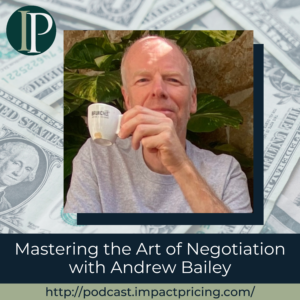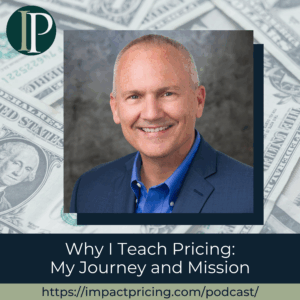Andrew Bailey is a Value Pricing and Price Negotiation Specialist. He is the founder of Commercial Strategy 4. He helps you unleash your pricing power to sell more, more often, and at a higher price to achieve the profits you deserve.
In this episode, Andrew shares his strategy for value-based pricing negotiations to help you achieve the highest possible pricing for your product or service.
Podcast: Play in new window | Download
Why you have to check out today’s podcast:
- Explore how you can present alternative options during negotiations by combining price and value selling strategies
- Discover one great technique for setting the stage and preparing the buyer’s mindset for a pricing value conversation
- Uncover a more effective approach to pricing instead of simply relying on discounts
“Improve your prices and just get really good at customer conversations.”
– Andrew Bailey
Topics Covered:
01:14 – How he started in pricing
03:40 – Important consideration for negotiation
04:58 – Defining value for clients and questions to ask to understand the value you’re delivering
09:21 – Dealing with procurement people versus the pricing committee as you go through value discovery process
12:32 – Key insights on opposing viewpoints between procurement and committee
14:28 – Practicing real-life price negotiations
16:36 – Pricing and value negotiation strategy that people rarely do but should be considered
24:08 – The biggest mistake in pricing negotiations and what should be done instead
27:53 – Andrew’s best pricing advice to impact one’s business
Key Takeaways:
“Ultimately, your ability to achieve the results that you want in pricing and negotiating is focused around your negotiating strength.” – Andrew Bailey
“What I talk to people about is understanding what’s really important to customers, what matters to them.” – Andrew Bailey
“Don’t try to make a whole long list of things that you can do for your clients and customers. It’s probably two or three things that’s really important to them. Just focus on that. That’s a great place to get to.” – Andrew Bailey
“We can give some discount and then we agree to it without really thinking about, could we do this differently? Is there a better way, is there more value here than simply that price and that quantity?” – Andrew Bailey
Connect with Andrew Bailey:
Connect with Mark Stiving:
- LinkedIn: https://www.linkedin.com/in/stiving/
- Email: [email protected]
Full Interview Transcript
(Note: This transcript was created with an AI transcription service. Please forgive any transcription or grammatical errors. We probably sounded better in real life.)
Andrew Bailey
Just get better at implementing. And if you can get better by one, two, 3% every time you talk to your customers, then by the end of the year you’re going to be in a whole different place.
[Intro]
Mark Stiving
Welcome to Impact Pricing, the podcast where we discuss pricing, value, and the exciting relationship between them. I’m Mark Stiving, and our guest today is Andrew Bailey. And here are three things you are going to know about Andrew before we start. He has been running Price Without Fear since 2008. He was director of pricing at Molson Coors Brewers. Oh my gosh, I love that. He wrote the book, the Seven Biggest Mistakes People Unwittingly Make when Negotiating and How to Avoid Them. Oh, and he recently started Dog Agility Training and he emphasized it was his dog doing the agility. Welcome, Andrew.
Andrew Bailey
Hi, Mark. Good to be here.
Mark Stiving
Hey, it’s great to have you again. How did you get into pricing?
Andrew Bailey
To be honest with you, I really, sort of stumbled across it. Running a sales team continually being asked to deliver more profit, more customers, more value. Every year it got more and more difficult. And I looked at the different ways to be able to achieve those targets. And like lots of people had a bit of a light bulb moment where you realize just how powerful pricing can be and did the numbers, worked it out, and you think, actually this is a whole lot easier just to get a little bit more pricing effectiveness, more money out of our customers than it is to go and get a whole lot of new customers. It’s difficult to get new customers, so let’s just be better at getting what we can from them. And then went on to deliver profit through that.
Mark Stiving
Yeah, and I would guess, correct me if I’m wrong, but I would guess selling beer is a pretty small margin product, so you’re not making phenomenal margins. And what that would say is a small increase in price has a really big impact on profit as opposed to a huge, huge number of new customers or revenue growth in that direction.
Andrew Bailey
Yeah, absolutely. And very competitive for those new customers as well. So, it’s not easy to get them. So yeah, focusing on those sorts of areas, did that for a while. And then I was asked to do the job across the business as a whole. I mean, I don’t think anybody jumps out of bed and says they want to get into pricing until you get into it and you realize just how important it can really be, not just the numbers, but I think what’s fascinating as well is we all know that if we see the price of a product or service, we just immediately have a view as to how good it is just by that one simple number. So it’s much more powerful than just the numbers. It’s everything to do with it. It’s just great fun, great, great business to be in.
Mark Stiving
Yeah. I think every single one of us who are in pricing fell into pricing somehow accidentally. Yeah. But that’s okay. We stayed because it’s so powerful and it’s actually fun. So, hey, let’s talk about negotiations today. I love thinking about negotiations. Before I give you any specific hard questions, let me just tee it up and tell me, what do you think is the most important thing for us to be thinking about when we think about negotiations?
Andrew Bailey
As a number of areas, the one that I always come back to with my clients is, and I know this will resonate with you and lots of other pricing people, is the issue around value and the impact and results we have with our customers. Because ultimately I think your ability to achieve the results that you want in pricing and negotiating is focused around your negotiating strength. And if there’s one thing that builds that, more than anything, it’s your value proposition to your customers, how important you are to them, the results you can get, the impact you can have on your business. So more often than not, I get into a discussion with my clients about their value, understanding what’s really important to their customers and fundamentally being better at that than anybody else. And if they can do that, then their ability to negotiate, and get the terms that they want with their customer are just so much better.
Mark Stiving
So you’re absolutely right that it resonates a lot with me. How do you help a client understand value? Or how do you define value for a client?
Andrew Bailey
I think I wouldn’t dream of defining value for a client. It’s for the client to really define what value means for them, , and to work with them and discover what that is. So, trying to work out, I think, what I talk to people about is understanding what’s really important to customers, what matters to them. I think sometimes value can be a little bit of a vague term if we are not specific about it, but if we can help the customer discover what value is for them, then I think that’s a really important aspect of value selling that we can do with them. And just helping them do that is valuable in itself before we’ve even talked about what we could do to help them with that. So focusing on the customer and what it means to them, I think is the most important thing.
Mark Stiving
Yeah. So I’m a hundred percent in agreement, and by the way, when I ask you these questions, I’m happy to share with you my thoughts as well. But I really want to know what questions you are asking your customers? So that you can get to how much value they’re delivering to their customers?
Andrew Bailey
Yeah, I think, for me it’s about understanding where they are, where they want to get to in their business, what that looks like for them, how they’re going to measure that, how can they quantify what the impact of that value, transformation, if you like, and what they do and what they do for their customers in the same way. And I think trying to get people to quantify their value on what they do is quite tough for some people and some businesses, but if you can do that and get to some really great numbers on the impact that you can have, then that’s so much more powerful. So much more powerful to have that conversation. And if you move that forward into our ability to get the prices that we want and negotiate around that, we can begin to quantify that value and position ourselves as often, try and say to people, forget about USPs, try and think about yourself as the MVP, the most valuable provider to your customers. So if you can get to a point where you can talk about how much more impact you can have over and above one of your competitors or your competitive set, and you can evidence that with numbers, I’m not sure there’s a more powerful position to be in, really.
Andrew Bailey
Yeah. I think that’s absolutely a spot on when you think about the results we’re delivering to clients, whatever those results happen to be. Yeah. If you can quantify those results and the client or the customer believes it, then, we can use business acumen to help figure out, well, gee, when you do this, it puts many more profit dollars in your pocket. Yeah. Or better yet, let the customer do the math and we just hold their hand while they do it.
Andrew Bailey
Yeah, absolutely.
Mark Stiving
So when we think about those quantitative results, I tend to think in terms of things like, in how much are we going to increase your production? How much are we going to decrease your turnover, right? So there are things that really matter to people that they’re thinking about. And when you can get them to say, yeah, if you solve this for me, then, yeah, I’m going to have a 2% decrease in turnover. Well, awesome, now we can go do the math and figure out, well, how much more profit does that put in your pocket? So I agree a hundred percent with you.
Andrew Bailey
Yeah. And, I think the important thing to remember is…
Mark Stiving
Go ahead.
Andrew Bailey
No, and I think the important thing that I talk to people about as well is, , don’t try to make a whole long list of things that you can do for your clients and customers. It’s probably two or three things that’s really important to them. Just focus on that. And if you just focus on that, that’s a great place to get to.
Mark Stiving
Yep, exactly right. Exactly right. So, awesome. Now that we are in radical agreement on value, let’s get back to negotiations.
Andrew Bailey
Yeah. Good.
Mark Stiving
So here’s a hard one that I deal with that I think about a lot, and that is the difference between the committee or the person who cares about value and the person who’s doing the negotiations. So oftentimes there’s a procurement person doing negotiations, and yet we would sell our product to a committee and they love our value and they chose our product because we had such phenomenal value. So how do you handle procurement people versus the committee?
Andrew Bailey
We’ve got to recognize that in some negotiations it’s going to be different people and it could be the end user, the operations people, it could be that buying committee and work through if we’re dealing with both sets, then we’ve going to have some robust strategies, if you like to understand what’s important to each set of those buyers and be able to work our quantified proposition to what those value drivers are for each of them, because they may be different. And we’ve going to recognize that. And part of that value discovery process that we go through, we’ve got to look at different dimensions. We’re going to look at what’s important for each buying group, what’s important for the business, both on a rational, if you like, numbers-driven basis, but also from an emotional basis as well, because we know people by, on emotional reasons as well as the rational logic, what makes sense.
So we are going to take our time to try and understand what that means for those different players, and engage with them to find that out. And then our proposition has got to focus on those different areas for those different buyers. And for the more complicated, selling situations with perhaps bigger organizations, that takes a little bit of time to work through. If it’s a business owner of a medium-sized business, when they’re playing the role of the buyer, procurement and running the operations themselves as well, then it’s perhaps a little bit more straightforward. But we are just going to be prepared to, I think, put the work in and our preparation to understand what’s important to those different people and layer our proposition to be able to achieve it. And there’ll be common grounds in that proposition as well.
Mark Stiving
So let me tell you a story. I’ve told this one before, but I have to share it in this situation. Back a long, long time ago, I was working for a company and I was leading a committee of people and we had chosen a brand new pricing system that we were going to buy and put into our company. And we went to procurement and we said, hey, let’s go buy this. And they said, the first thing they said to me is, give me two competitors. And I said, no, you don’t get it. We’re going to buy this one. And he goes, no, you don’t get it. Give me two competitors. So I gave him a couple competitors names. I was allowed to sit in on the very first meeting that he had with the vendor that we had selected. And I am not joking, the procurement person looked at this company and said, we’re looking at three other vendors, you guys are the most expensive ones so you better sharpen your pencil and come back. It was just a flat lie. And after the meeting I talked to procurement about that and he goes, you are not invited to any more of these meetings and you may not talk to that vendor until this is done. And so it was just incredible to me when I think about the difference between the way procurement thinks and the way the committee thinks. Because I was on the committee. I was running that committee.
Andrew Bailey
Yeah.
Mark Stiving
So any brilliant thoughts?
Andrew Bailey
Yeah. It’s well, I think the first one and when I get people together and do pricing work with clients and programs one of the things you have to get into people’s minds is you just don’t believe everything you hear. And having a well formulated set of questions to go back with is really important. Just because somebody makes a statement in procurement does not mean that that’s true. It doesn’t mean that they’re not trying to use tactics to get around it, it doesn’t mean it’s really easy to say you are really good, but you’re going to have to sharpen your pencil. And if you do that, we can carry on talking. People have to be a little bit braver, get over their fear and ask some questions and be prepared to talk about that value and why they’re important and why, which is why they’re that combination of value pricing and negotiating are really important.
They’ve got to be able to feel comfortable to justify why the price is the way that it is, the value that it delivers. And if they have got that proposition, which is why it’s so important, and they know they are more valuable to that customer than the alternatives and some competitors, then they can be really confident about it. And I’ve seen procurement teams, procurement buyers , get a little bit flummoxed by all of that because they’re not expecting it. They’re expecting that, okay, yeah, okay, we might be able to do this. We could perhaps do it for this price rather than, what’s the reason I should lower the price on the most valuable product in the market?
Mark Stiving
Yeah. Fabulous answer. And I often think in terms of gives and gets. So if somebody wants to negotiate, then, I’ll never lower my price, but I will give you a lower price for a lesser product or lesser delivery.
Andrew Bailey
I think it’s a great tactic and something that is absolutely right. What I do find though, Mark, which is really interesting, is I talk to people about that. I ask them the question, what would they do in that type of situation? And pretty much seven or eight out of 10 will give the same answer, yeah, of course, I could offer you a lower priced option, but this is the value that’s going to be in that option. And it’s not going to be the value of the other one we talked about, but when we get into practicing those sorts of situations with those people in those teams, or we observe them in real life negotiations, they tend to lose a little bit of that bravery and it sort of escape them.
And they find it much less easy to sit in front of a buyer, a trained buyer, and have that conversation. So one of the things that I think is really important is that people practice these sorts of situations. They practice those words and say them. I often say to people, that’s why bathroom mirrors were invented so that we can practice our price conversations just to get them really really where they need to be. Because it’s easy to do it in a classroom, but actually in front of somebody it’s difficult. And unless you practice that, it can be a real blocker for people.
Mark Stiving
Yeah. I don’t, so I’m going to think about my personal business now, right? The business I run today, and I think, I’ve been doing this for four years and two people in my history have tried to negotiate with me, which is pretty fascinating. Yeah. And, it may be my attitude that they just don’t try, but both people who tried the answer in both cases were, we’ll change the deal to get you a better price. Right. It’s never, I’m going to give you a better price, but I think the reason that works for me is because I’m okay losing the business.
Andrew Bailey
Yeah.
Mark Stiving
And most salespeople are not okay losing the deal.
Andrew Bailey
One of the things that people rarely do in negotiating is something that you’ll be really familiar with from a pricing perspective is the idea of providing people with options. That very thought of, we can reduce the price, we can give you a different option of whatever the product service configuration might be. So we’re all used to gold, silver, bronze type options, good, better, best type models from a pricing perspective. But rarely do people use that type of principle in a negotiation we talk about. Here’s our proposal, or we respond to a proposal. We rarely present in a negotiation. Say, these are the things that we could do. We could either offer you this type of deal, or if that’s more important, we could offer you this. Or we could cut that in a slightly different way.
We tend to still be at the negotiation stage, take an arbitrary, here’s our proposal. And I think negotiators could learn a little bit more from pricing and value selling in the sense of, it’s okay to offer options in a negotiation. There’s no reason why you can’t do that. Because it’s a great way, again of opening up those opportunities and retesting out, if you like, what’s really important to our customers because they will go for the options that are more valuable to them. So why not do that as part of a negotiation, as well?
Mark Stiving
Yeah. I don’t know why in my mind, this concept of gives and gets is just ingrained in my head. And, it seems to me that it should be ingrained in everybody who’s negotiating. Why would I ever give you a discount if I didn’t get something in exchange for that discount? Because if I just lowered my price, it says, oh, I was cheating you before, I was just trying to get a higher price than I should have gotten. And so I don’t know why. Why do you think salespeople don’t always get something when they give a discount?
Andrew Bailey
One of the reasons is, they perhaps did not have any training, which you would imagine is hard to believe these days. Because a standard is to pick up any negotiating book, go on any negotiating course. A court principle as always, you don’t give anything up without getting something back in return. Or if you lower the price, you take something away from the value. It’s that give-get approach. Absolutely. Core and fundamental to all types of negotiating, particularly price negotiations. I think from my experience, I see a lot of people, they’re just fearful of the negotiation, fearful of what they might lose out, fearful of losing the deal. The personal implications of not winning the deal from both sides, both from a seller and a buyer perspective, that the buyer will have to ask for a discount or a lower price because they’re probably going to be asked by their boss, did you get a lower price?
The seller needs to get the deal done to achieve their targets and get the okay from their boss. So I think that sometimes just everybody is so focused on agreeing a deal that we asked for a discount. Yeah, we can give some discount and then we agree to it without really thinking about could we do this differently? Is there a better way, is there more value here than simply that price and that quantity if you like? , so I think people are just a little bit fearful, wrapped up in not wanting to be challenged, have some objections and disagree that when they can see, yeah, I can get the deal away and I can buy this and that’s all good. And it ticks lots of boxes both numbers wise and for me personally and the business, that it’s easier to get through that by agreeing rather than exploring other ways.
Mark Stiving
So I wonder if salespeople signal that they’re open to negotiating or lowering prices during the sales process or during the communications? Right. So if you were to ask me my fee and I would say, my fee is $15,000. I mean, that’s just what it is. But if I would say my fee is $15,000, but, for some people I can do something else. It’s like I just said, come negotiate with me. You don’t have to pay the full fee.
Andrew Bailey
Yeah. I think some salespeople will do that. They will have that demeanor, whether that’s conscious or subconscious, in the words they use or just how they behave that says, yeah, if you asked me for a discount, I’ll probably do something for you. Or, something off the price. The flip side is, other people give off other signals and you and me would probably have a bit of an advantage because if people look at our profiles and what they do, they’ll probably say, right, I’m going to go and talk to Mark about pricing. Chances are if I ask for a discount, he won’t give me one because he knows what he’s doing and he’s really good at it. So, tell you what, I won’t bother asking because it’s easier.
I have sat in front of somebody before and they’ve asked me what I’ve done and I said, well, I help businesses with pricing and negotiating not for any other reason than just building the relationship. And they’ve sort of gone a little bit stoney faced a bit crestfallen thought, oh, right, okay. It’s going to be a little bit difficult then. Not that it was, but , so it’s those messages that you give off absolutely. Do either encourage people to ask or discourage people. One of the things that I help people with is, and again goes back to why an understanding of pricing value is really important to price negotiations is, what we can do in the conversation we have with people is to think about how we are going to frame the conversation. If you like, perhaps use some anchors or priming to get the customer in the right frame of mind that when we do get to talk about what we can offer them, our proposition and the price that goes with that, they’re in a much more accepting place than they would be if we get to that part of the sales process and just deliver our price without some pre-warning, if you like, about what it’s going to be.
And the classic, I don’t particularly recommend people do this, but the classic way of doing that is at the start of the conversation saying, look, we’re not the cheapest out there. It’s just a great way of priming the customer to say, if you want cheap, go somewhere else. I’m going to be a bit more expensive. And if they carry on talking, it gives you permission then later in the conversation to deliver a higher price. So we can do a lot to get our customer in the right frame of mind before we hit them with our price.
Mark Stiving
Yeah. I actually love saying something like, we’re not the cheapest or, this is relatively expensive when I teach clients this, but I usually use that as a lead into the next question, which is, so let’s figure out if this is really worth it to you, and now we’re going into a value conversation. Yeah. Right. Absolutely. Let’s figure out what the value is to you. And I love that line.
Andrew Bailey
Yeah.
Mark Stiving
You wrote a book on seven mistakes that people make. What’s the biggest one?
Andrew Bailey
I think that, for me, I would always go back to the biggest mistake, is people not preparing for their price negotiations enough. And depending on the negotiation you’re going to have could be quite simple, could be more complex, but it’s that lack of preparation that is usually driven by either a lack of knowledge about the negotiation process and how we can lead that. Or it’s a lack of preparation because people just don’t like negotiating. And the potential confrontation that goes with it and the thought that you might lose a negotiation if that’s the thing to say or people have, which lends itself to more senior people in organizations, in my experience, they have a bit more of an ego in their negotiating and more of a belief that they can prepare and get through it during the negotiation rather than putting in the hard part and the effort before.
So I think preparation is really, really important. And if you prepare and you have got that process, then even experienced negotiators who don’t like the process and get a little bit stressed and anxious about it, can still go through a negotiation, follow the process, use the right sort of tools and techniques, and can get really good deals at the end of it much better than those people who do no prepare. Might have great other skills but just miss the opportunities. So preparation is absolutely key and I would recommend it every single time.
What do you expect them to prepare? I mean, in my mind I’m thinking I want to be prepared with being able to talk about the value of the product. So the value to the customer. Yeah. And I want to be able to have my gives and gets in line, right? Yeah. So what do I need to get if they ask me for a discount? Anything else we should prepare?
Andrew Bailey
Yeah, I’d agree with that. Absolutely. If we don’t have those gives-gets, then we can tend to give more than we get and we lose too much value. Understanding the value we offer to our customers is really important. I think for me as well is looking at the negotiating strength that we have in terms of why we are negotiating, what we want to get out of it, our relationship with, our customer, what we can do with them just to understand what that power balance, if you like, feels like, not from the point of view that we’re going to use it to drive down an even harder bargain on the other person or the other side, but, just to be able to use it to leverage the best deal that we can do. So I think if we understand what that is, we understand the value and value will be part of that equation.
We’ve got our objectives, we understand what we are prepared to give, not give. At what point we are going to just not continue with the negotiation and walk away? I think if you’ve got lows in place. And I always say to people, yeah, don’t just think about it, write it down, have it in front of you when you are negotiating so that you can follow your plan. Those are the really important areas to think about, but it does take a little bit of time to do the preparation. We need to know a little bit more about our customer, and if we’ve been through that value discovery process, we’ll know quite a lot about them anyway. And we can use that as we develop that approach. So, , those are the key areas I think that make a difference.
Mark Stiving
Yeah. Nice. Andrew, we are running out of time, so let me ask the final question.
Andrew Bailey
Sure, yeah.
Mark Stiving
What is one piece of pricing advice you’d give our listener? What is one piece of pricing advice you’d give our listeners that you think could have a big impact on their business?
Andrew Bailey
One piece of advice. For me it is about focusing on implementing what they do in the best way that they can. And not being focused on what the perfect price is or the ideal price for what they do. So improve their prices and just get really good at customer conversations, how they sell value if they need to negotiate. How can they do that? Focus on implementation and getting the prices that they want and then beginning to move those forward and if they feel they’re too low moving them forward and increasing and not getting worked up about finding. What’s the ideal price I should be charging? Because you probably can’t find that anyway because it’s all contextual and different customers have different situations, so just get better at implementing. And if you can get better by one, two, 3% every time you talk to your customers, then by the end of the year you’re going to be in a whole different place.
Mark Stiving
That’s a fabulous answer. Yeah. I often say that value-based pricing simply means charging what your customers are willing to pay, but we can’t read customers’ minds, so there’s no way we know the answer to that question. Andrew, thank you so much for your time today. If anybody wants to contact you, how can they do that?
Andrew Bailey
Easiest way to contact me is on LinkedIn, so, Andrew Bailey on LinkedIn, Price Without Fear or email is [email protected]. Get in touch with me and that’ll be great.
Mark Stiving
Perfect. And to our listeners, thank you very much for your time. If you enjoyed this, would you please leave us a rating and a review? You can get instructions by going to ratethispodcast.com/impactpricing. And finally, if you have any questions or comments about the podcast or pricing in general, feel free to email me mark@impact pricing.com. Now, go make an impact!
















